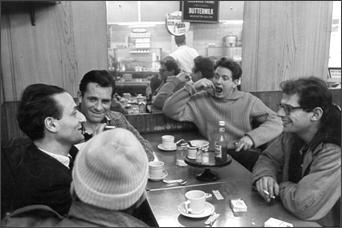SEARCH CurtainUp
REVIEWS
FEATURES
NEWS (Etcetera)
LISTINGS
Broadway
Off-Broadway
BOOKS and CDs
OTHER PLACES
Berkshires
London
Los Angeles
Philadelphia
Elsewhere
QUOTES
On TKTS
LETTERS TO EDITOR
FILM
LINKS
MISCELLANEOUS
Free Updates
Masthead
NYC Weather
Door Wide Open
by Les Gutman
|
Silence is not a rebuke. ---Kerouac |

Larry Rivers, Jack Kerouac, David Amram and Allen Ginsberg
|
From the 21st Century vantage point, media packaging of instant celebrities is an accepted vulgarity. A half century ago, we'd like to think it was not so, but Jack Kerouac, were he alive, would beg to differ. He was packaged and labeled ("the King of the Beats"), against his will and perhaps tragically. Door Wide Open, based on a collection of letters written between Kerouac and his one time girlfriend, Joyce Glassman Johnson, shines some light on the year and a half period during which the two dated. It was a time, not insignificant, during which On The Road triggered his catapult into the public's imagination.
Interestingly enough, the play is not all about Jack (John Ventimiglia). Joyce (portrayed by Adira Amram as the young woman Jack met via Allen Ginsberg, as her present self by Amy Wright) was a literary figure in her own right, though not well known for it, and one of the striking things about the letters is that hers are far more eloquent. The letters chronicle Kerouac's familiar journeys, near and far, with his pals, Ginsberg, Burroughs et al, and also show much about his more private side: his drinking, his abhorrence of his public persona, his unusually close relationship with his Memere and the underlying insecurities that fueled them. Much attention is given to his roving eye and the resulting infidelities, and to Joyce's reluctance to challenge his behavior. As told, the story is both sad and compelling.
Tony Torn's staging of Door Wide Open is more of a "unique theatrical experience" (to borrow a popular award category) than a traditional play. The actors sit on stools with the increasingly familiar stands holding their scripts. The brooding Bethany Wright wanders on and off stage as Elise Cowen, and director Tony Torn occasionally barks from the bar at the rear of the club. The impression -- far more successful than its description might suggest -- is part play, part spoken word performance, underscored by the presence of David Amram performing original musical accompaniment (about which more in a minute).
John Ventimiglia, best known as a featured member of the cast of The Sopranos, is a very believable Jack. His cocky sex appeal belies if it does not occlude what Elise Cowen describes as the saddest man she's ever seen. Amy Wright, who is quite wonderful, is the authorial voice of Joyce Johnson, interestingly permitted to interact with her younger self in the form of Ms. Amram (who is also quite convincing). It's entertaining and provides a meaningful "then and now" perspective.
It would be hard to conjure up as much verisimilitude as David Amram's presence in this show provides. A prolific composer (of theatrical, film and orchestral music) and a major figure in world music, he was a part of the Beat world that this show depicts. More than three decades ago, he could be found onstage with Kerouac as his musical accompanist, often at The Five Spot, a venue that was only a block and a half from the location of the Bowery Poetry Club where this production is performed. The music he provides here (on a wide variety of instruments ranging from an electronic keyboard to a remarkable wooden wind instrument called a double ocharina) is a joy to hear, perfectly attuned to its purpose and reflective of a man who clearly understands how to sharply marry story to resonant music.
The title of Joyce Johnson's book and play derives from a cable she sent responding to Kerouac's inquiry about staying with her on one of his many returns to New York from his travels. It's also an apt description of the effect of the piece. Not a legend, not a scandal, it's an accessible portal to a particular place and time. It's nostalgia, of course, but in the finest possible sense; to quote a decidedly non-Beat poet, Longfellow, "a feeling of sadness and longing that is not akin to pain, and resembles sorrow only as the mist resembles the rain".
|
Door Wide Open by Joyce Johnson, based on letters by Jack Kerouac and Ms. Johnson Directed by Tony Torn with Amy Wright, John Ventimiglia, Adira Amram and Bethany Wright (substituted for Meg Booker) Original Score Composed and Performed by David Amram Running time: 2 hours with one intermission A production of Sanctuary Theater Workshop Bowery Poetry Club, 308 Bowery (Bleecker/Houston) Telephone: (212) 614-0505 SAT - SUN @7:30; $15 Opening May 25, 2003, closing June 8, 2003 Reviewed by Les Gutman based on 5/18/03 performance |

Mendes at the Donmar
Our Review

At This Theater

Leonard Maltin's 2003 Movie and Video Guide

Ridiculous!The Theatrical Life & Times of Charles Ludlam

Somewhere For Me, a Biography of Richard Rodgers

The New York Times Book of Broadway: On the Aisle for the Unforgettable Plays of the Last Century

6, 500 Comparative Phrases including 800 Shakespearean Metaphors by CurtainUp's editor.
Click image to buy.
Go here for details and larger image.



